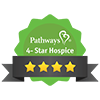The Hidden Power of Purpose
 It’s often said: “I didn’t pick Hospice, it picked me.” When we find our purpose in life, it guides us and gives our life meaning and richness.
It’s often said: “I didn’t pick Hospice, it picked me.” When we find our purpose in life, it guides us and gives our life meaning and richness.
Leading a happy life requires the feeling that what we do is worthwhile. But what this means is different for each person. What experts can agree on are the benefits of living a life of purpose. They include:
- The body sends a signal to our immune system to function at its best
- Fewer strokes and heart attacks
- Better sleep
- Lower risk of dementia
- Lower risk of disabilities
When finding purpose, many people in the hospice profession began the process with self-reflection, listening to others, and exploring their passions. Examples of strategies used by hospice professionals to find their purpose to live a more meaningful life include the following:
- Donated time, money, or talent. Many people who found their way into a career of hospice started by getting involved gradually. They learned more about the power and services of hospice as volunteers for their hospice organization, donated money to the cause, or even helped out their neighbors and friends. As a hospice donor, Martin received the foundation’s newsletter and read about how his contributions were used. Over time he learned more about what hospice is and how it affected people’s lives.
- Listened to feedback. Hospice professionals listened to others around them to give them insight into the profession. Alison found she was already displaying her passion for helping others without even realizing it. When she was volunteering at church to visit homebound parishioners, she took note when family members told her how patient, compassionate, and encouraging she was with their loved ones. Hearing what others noticed about her reinforced passions she was already engaged in.
- Surrounded by positive people. Hospice professionals often think back regarding the people they chose to spend time with outside of work and family functions. At her Pilates class, Cheri would regularly chat with Erin while they waited for class to begin. Cheri learned Erin was starting a grief program for children. Cheri was inspired by the positive change Erin was making for the children and their families.
- Started conversations with new people. Talking to people outside of their immediate social circle opened their eyes to activities, causes, and career opportunities that they never even knew existed. Paul was part of a hiking group and started talking with one of the members on the trail and found out about the hospice industry by asking about the organizations his fellow hiker was involved in.
- Discovered what they loved to do. Some hospice professionals thought about what they truly loved to do to help them find their purpose. Maggie thought about and wrote down her skills, talents, and passions. Then, she brainstormed with her son to identify how she could turn her passion into something meaningful.
Knowing whether you’ve found your purpose is subjective. Feeling fully connected to the universe, knowing your place in it, and feeling settled may be signs you’ve found your purpose. Other ways to validate your purpose is perhaps you have a strong connection with others. Ultimately, you’ve likely found your purpose if you’ve stopped asking whether you have.



